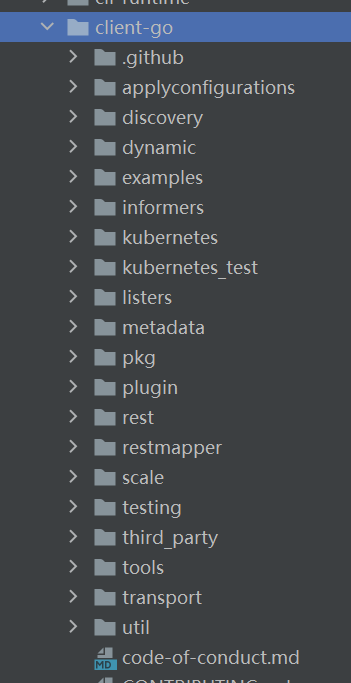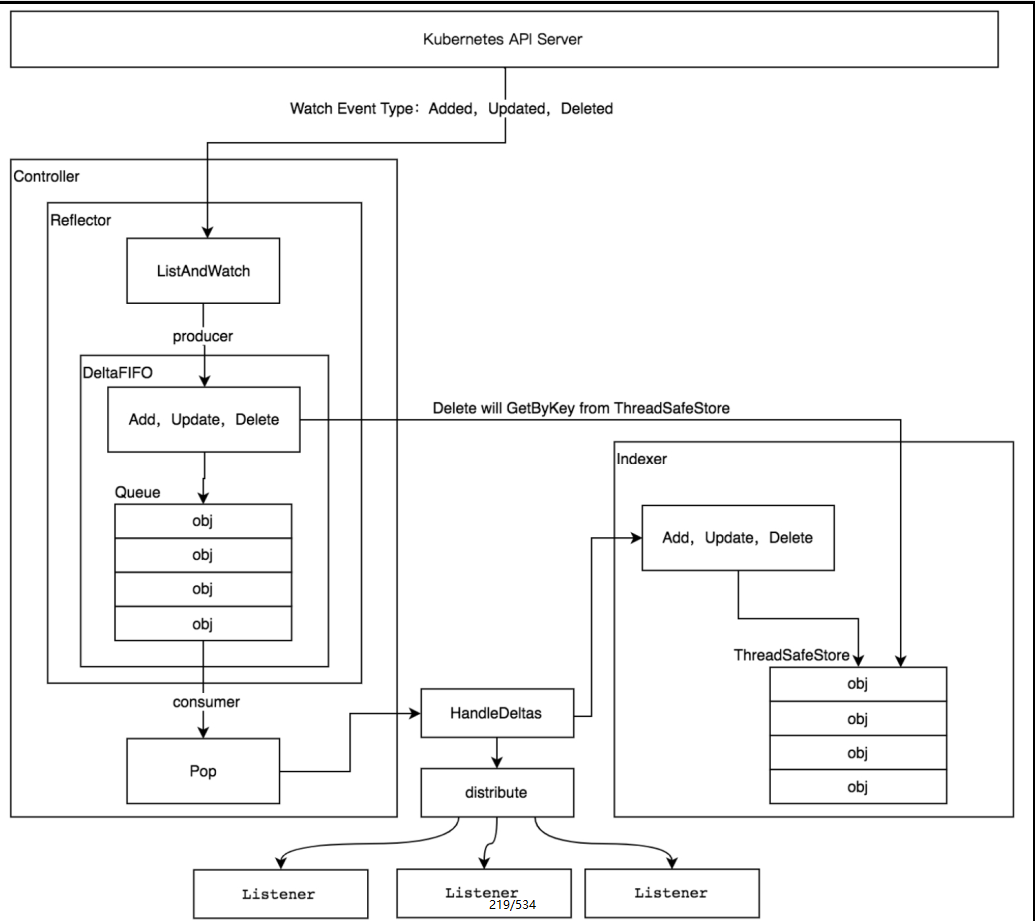client-go,这个很牛,k8s大部分交互都靠它

discovery/dynamic动态客户端;informers是非常重要的通讯机制;kubernetes是clientset客户端;rest是rest客户端;util包含队列等
RESTClient是最基础的客户端。RESTClient对HTTP Request进行了封装,实现了RESTful风格的API。ClientSet、DynamicClient及DiscoveryClient客户端都是基于RESTClient实现的。
type Interface interface { GetRateLimiter() flowcontrol.RateLimiter Verb(verb string) *Request Post() *Request Put() *Request Patch(pt types.PatchType) *Request Get() *Request Delete() *Request APIVersion() schema.GroupVersion }
client
type RESTClient struct { // base is the root URL for all invocations of the client base *url.URL // versionedAPIPath is a path segment connecting the base URL to the resource root versionedAPIPath string // content describes how a RESTClient encodes and decodes responses. content ClientContentConfig // creates BackoffManager that is passed to requests. createBackoffMgr func() BackoffManager // rateLimiter is shared among all requests created by this client unless specifically // overridden. rateLimiter flowcontrol.RateLimiter // warningHandler is shared among all requests created by this client. // If not set, defaultWarningHandler is used. warningHandler WarningHandler // Set specific behavior of the client. If not set http.DefaultClient will be used. Client *http.Client }
ClientSet在RESTClient的基础上封装了对Resource和Version的管理方法。每一个Resource可以理解为一个客户端,而ClientSet则是多个客户端的集合,每一个Resource和Version都以函数的方式暴露给开发者。ClientSet只能够处理Kubernetes内置资源,它是通过client-gen代码生成器自动生成的。
type Clientset struct { *discovery.DiscoveryClient admissionregistrationV1 *admissionregistrationv1.AdmissionregistrationV1Client admissionregistrationV1beta1 *admissionregistrationv1beta1.AdmissionregistrationV1beta1Client internalV1alpha1 *internalv1alpha1.InternalV1alpha1Client appsV1 *appsv1.AppsV1Client appsV1beta1 *appsv1beta1.AppsV1beta1Client appsV1beta2 *appsv1beta2.AppsV1beta2Client authenticationV1 *authenticationv1.AuthenticationV1Client authenticationV1beta1 *authenticationv1beta1.AuthenticationV1beta1Client authorizationV1 *authorizationv1.AuthorizationV1Client authorizationV1beta1 *authorizationv1beta1.AuthorizationV1beta1Client autoscalingV1 *autoscalingv1.AutoscalingV1Client autoscalingV2beta1 *autoscalingv2beta1.AutoscalingV2beta1Client autoscalingV2beta2 *autoscalingv2beta2.AutoscalingV2beta2Client batchV1 *batchv1.BatchV1Client batchV1beta1 *batchv1beta1.BatchV1beta1Client certificatesV1 *certificatesv1.CertificatesV1Client certificatesV1beta1 *certificatesv1beta1.CertificatesV1beta1Client coordinationV1beta1 *coordinationv1beta1.CoordinationV1beta1Client coordinationV1 *coordinationv1.CoordinationV1Client coreV1 *corev1.CoreV1Client discoveryV1 *discoveryv1.DiscoveryV1Client discoveryV1beta1 *discoveryv1beta1.DiscoveryV1beta1Client eventsV1 *eventsv1.EventsV1Client eventsV1beta1 *eventsv1beta1.EventsV1beta1Client extensionsV1beta1 *extensionsv1beta1.ExtensionsV1beta1Client flowcontrolV1alpha1 *flowcontrolv1alpha1.FlowcontrolV1alpha1Client flowcontrolV1beta1 *flowcontrolv1beta1.FlowcontrolV1beta1Client networkingV1 *networkingv1.NetworkingV1Client networkingV1beta1 *networkingv1beta1.NetworkingV1beta1Client nodeV1 *nodev1.NodeV1Client nodeV1alpha1 *nodev1alpha1.NodeV1alpha1Client nodeV1beta1 *nodev1beta1.NodeV1beta1Client policyV1 *policyv1.PolicyV1Client policyV1beta1 *policyv1beta1.PolicyV1beta1Client rbacV1 *rbacv1.RbacV1Client rbacV1beta1 *rbacv1beta1.RbacV1beta1Client rbacV1alpha1 *rbacv1alpha1.RbacV1alpha1Client schedulingV1alpha1 *schedulingv1alpha1.SchedulingV1alpha1Client schedulingV1beta1 *schedulingv1beta1.SchedulingV1beta1Client schedulingV1 *schedulingv1.SchedulingV1Client storageV1beta1 *storagev1beta1.StorageV1beta1Client storageV1 *storagev1.StorageV1Client storageV1alpha1 *storagev1alpha1.StorageV1alpha1Client }
DynamicClient与ClientSet最大的不同之处是,ClientSet仅能访问Kubernetes自带的资源(即Client集合内的资源),不能直接访问CRD自定义资源。DynamicClient能够处理Kubernetes中的所有资源对象,包括Kubernetes内置资源与CRD自定义资源。
DiscoveryClient发现客户端,用于发现kube-apiserver所支持的资源组、资源版本、资源信息(即Group、Versions、Resources)
type DiscoveryClient struct {
restClient restclient.Interface
LegacyPrefix string
}
在Kubernetes系统中,组件之间通过HTTP协议进行通信,在不依赖任何中间件的情况下需要保证消息的实时性、可靠性、顺序性等。Kubernetes的其他组件都是通过client-go的Informer机制与Kubernetes API Server进行通信的

1.Reflector
Reflector用于监控(Watch)指定的Kubernetes资源,当监控的资源发生变化时,触发相应的变更事件,例如Added(资源添加)事件、Updated(资源更新)事件、Deleted(资源删除)事件,并将其资源对象存放到本地缓存DeltaFIFO中。
type Reflector struct { // name identifies this reflector. By default it will be a file:line if possible. name string // The name of the type we expect to place in the store. The name // will be the stringification of expectedGVK if provided, and the // stringification of expectedType otherwise. It is for display // only, and should not be used for parsing or comparison. expectedTypeName string // An example object of the type we expect to place in the store. // Only the type needs to be right, except that when that is // `unstructured.Unstructured` the object's `"apiVersion"` and // `"kind"` must also be right. expectedType reflect.Type // The GVK of the object we expect to place in the store if unstructured. expectedGVK *schema.GroupVersionKind // The destination to sync up with the watch source store Store // listerWatcher is used to perform lists and watches. listerWatcher ListerWatcher // backoff manages backoff of ListWatch backoffManager wait.BackoffManager // initConnBackoffManager manages backoff the initial connection with the Watch calll of ListAndWatch. initConnBackoffManager wait.BackoffManager resyncPeriod time.Duration // ShouldResync is invoked periodically and whenever it returns `true` the Store's Resync operation is invoked ShouldResync func() bool // clock allows tests to manipulate time clock clock.Clock // paginatedResult defines whether pagination should be forced for list calls. // It is set based on the result of the initial list call. paginatedResult bool // lastSyncResourceVersion is the resource version token last // observed when doing a sync with the underlying store // it is thread safe, but not synchronized with the underlying store lastSyncResourceVersion string // isLastSyncResourceVersionUnavailable is true if the previous list or watch request with // lastSyncResourceVersion failed with an "expired" or "too large resource version" error. isLastSyncResourceVersionUnavailable bool // lastSyncResourceVersionMutex guards read/write access to lastSyncResourceVersion lastSyncResourceVersionMutex sync.RWMutex // WatchListPageSize is the requested chunk size of initial and resync watch lists. // If unset, for consistent reads (RV="") or reads that opt-into arbitrarily old data // (RV="0") it will default to pager.PageSize, for the rest (RV != "" && RV != "0") // it will turn off pagination to allow serving them from watch cache. // NOTE: It should be used carefully as paginated lists are always served directly from // etcd, which is significantly less efficient and may lead to serious performance and // scalability problems. WatchListPageSize int64 // Called whenever the ListAndWatch drops the connection with an error. watchErrorHandler WatchErrorHandler }
watch
func (r *Reflector) watchHandler(start time.Time, w watch.Interface, resourceVersion *string, errc chan error, stopCh <-chan struct{}) error { eventCount := 0 // Stopping the watcher should be idempotent and if we return from this function there's no way // we're coming back in with the same watch interface. defer w.Stop() loop: for { select { case <-stopCh: return errorStopRequested case err := <-errc: return err case event, ok := <-w.ResultChan(): if !ok { break loop } if event.Type == watch.Error { return apierrors.FromObject(event.Object) } if r.expectedType != nil { if e, a := r.expectedType, reflect.TypeOf(event.Object); e != a { utilruntime.HandleError(fmt.Errorf("%s: expected type %v, but watch event object had type %v", r.name, e, a)) continue } } if r.expectedGVK != nil { if e, a := *r.expectedGVK, event.Object.GetObjectKind().GroupVersionKind(); e != a { utilruntime.HandleError(fmt.Errorf("%s: expected gvk %v, but watch event object had gvk %v", r.name, e, a)) continue } } meta, err := meta.Accessor(event.Object) if err != nil { utilruntime.HandleError(fmt.Errorf("%s: unable to understand watch event %#v", r.name, event)) continue } newResourceVersion := meta.GetResourceVersion() switch event.Type { case watch.Added: err := r.store.Add(event.Object) if err != nil { utilruntime.HandleError(fmt.Errorf("%s: unable to add watch event object (%#v) to store: %v", r.name, event.Object, err)) } case watch.Modified: err := r.store.Update(event.Object) if err != nil { utilruntime.HandleError(fmt.Errorf("%s: unable to update watch event object (%#v) to store: %v", r.name, event.Object, err)) } case watch.Deleted: // TODO: Will any consumers need access to the "last known // state", which is passed in event.Object? If so, may need // to change this. err := r.store.Delete(event.Object) if err != nil { utilruntime.HandleError(fmt.Errorf("%s: unable to delete watch event object (%#v) from store: %v", r.name, event.Object, err)) } case watch.Bookmark: // A `Bookmark` means watch has synced here, just update the resourceVersion default: utilruntime.HandleError(fmt.Errorf("%s: unable to understand watch event %#v", r.name, event)) } *resourceVersion = newResourceVersion r.setLastSyncResourceVersion(newResourceVersion) if rvu, ok := r.store.(ResourceVersionUpdater); ok { rvu.UpdateResourceVersion(newResourceVersion) } eventCount++ } } watchDuration := r.clock.Since(start) if watchDuration < 1*time.Second && eventCount == 0 { return fmt.Errorf("very short watch: %s: Unexpected watch close - watch lasted less than a second and no items received", r.name) } klog.V(4).Infof("%s: Watch close - %v total %v items received", r.name, r.expectedTypeName, eventCount) return nil }
2.DeltaFIFO
DeltaFIFO可以分开理解,FIFO是一个先进先出的队列,它拥有队列操作的基本方法,例如Add、Update、Delete、List、Pop、Close等,而Delta是一个资源对象存储,它可以保存资源对象的操作类型,例如Added(添加)操作类型、Updated(更新)操作类型、Deleted(删除)操作类型、Sync(同步)操作类型等。
const ( Added DeltaType = "Added" Updated DeltaType = "Updated" Deleted DeltaType = "Deleted" // Replaced is emitted when we encountered watch errors and had to do a // relist. We don't know if the replaced object has changed. // // NOTE: Previous versions of DeltaFIFO would use Sync for Replace events // as well. Hence, Replaced is only emitted when the option // EmitDeltaTypeReplaced is true. Replaced DeltaType = "Replaced" // Sync is for synthetic events during a periodic resync. Sync DeltaType = "Sync" )
3.Indexer
Indexer是client-go用来存储资源对象并自带索引功能的本地存储,Reflector从DeltaFIFO中将消费出来的资源对象存储至Indexer。Indexer与Etcd集群中的数据完全保持一致。client-go可以很方便地从本地存储中读取相应的资源对象数据,而无须每次从远程Etcd集群中读取,以减轻Kubernetes API Server和Etcd集群的压力。